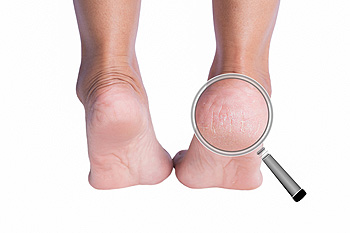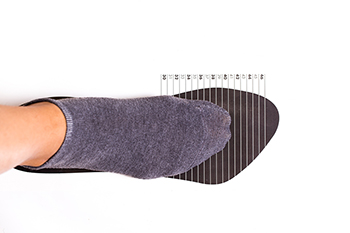Connect With Us
Blog

Stress fractures are tiny cracks in bones that often occur in the foot or ankle due to repetitive force, overuse, or sudden increase in activity. Common sites include the metatarsals, heel, navicular bone, and the lower part of the tibia. These injuries are especially frequent in runners, athletes, and those who spend long hours standing or walking. People with osteoporosis or low bone density are also at higher risk. Pain typically begins gradually and worsens with activity, often improving with rest. Swelling and tenderness over a specific area may also be present. If left untreated, a stress fracture can worsen and lead to a complete break. Early diagnosis helps avoid complications and supports proper healing. If you have foot or ankle pain that persists or worsens with use, it is suggested that you see a podiatrist for a diagnosis and appropriate treatment.
Stress fractures occur when there is a tiny crack within a bone. To learn more, contact Charles Passet, DPM from Forest Hills. Our doctor can provide the care you need to keep you pain free and on your feet.
How Are They Caused?
Stress fractures are the result of repetitive force being placed on the bone. Since the lower leg and feet often carry most of the body’s weight, stress fractures are likely to occur in these areas. If you rush into a new exercise, you are more likely to develop a stress fracture since you are starting too much, too soon. Pain resulting from stress fractures may go unnoticed at first, however it may start to worsen over time.
Risk Factors
- Gender – They are more commonly found in women compared to men.
- Foot Problems – People with unusual arches in their feet are more likely to develop stress fractures.
- Certain Sports – Dancers, gymnasts, tennis players, runners, and basketball players are more likely to develop stress fractures.
- Lack of Nutrients – A lack of vitamin D and calcium may weaken the bones and make you more prone to stress fractures
- Weak Bones – Osteoporosis can weaken the bones therefore resulting in stress fractures
Stress fractures do not always heal properly, so it is important that you seek help from a podiatrist if you suspect you may have one. Ignoring your stress fracture may cause it to worsen, and you may develop chronic pain as well as additional fractures.
If you have any questions, please feel free to contact our office located in Forest Hills, NY . We offer the newest diagnostic and treatment technologies for all your foot care needs.

Cracked heels are an uncomfortable foot issue that can cause pain, especially when pressure is applied while walking or standing. The primary cause of cracked heels is dry skin, which can worsen due to prolonged standing, wearing open-back shoes, or exposure to harsh weather. Conditions like obesity, diabetes, and skin disorders such as eczema can also contribute to the problem. As the skin loses moisture and elasticity, it thickens and eventually cracks, leading to pain and even infection. A podiatrist can help treat cracked heels by thoroughly examining your feet and providing professional care. Treatment may include debridement to remove dead skin, moisturizing therapies, and recommendations for proper footwear. A podiatrist may also suggest orthotics or other interventions to address underlying causes, promoting healing and preventing future cracks. If you are dealing with painful cracked heels, it is suggested that you make an appointment with a podiatrist for a treatment plan.
Cracked heels are unsightly and can cause further damage to your shoes and feet. If you have any concerns, contact Charles Passet, DPM from Forest Hills. Our doctor can provide the care you need to keep you pain-free and on your feet.
Cracked Heels
Cracked heels appear unappealing and can make it harder for you walk around in sandals. Aside from looking unpleasant, cracked heels can also tear stockings, socks, and wear out your shoes. There are several methods to help restore a cracked heel and prevent further damage.
How Do You Get Them?
Dry skin is the number one culprit in creating cracked heels. Many athletes, walkers, joggers, and even swimmers suffer from cracked heels. Age and skin oil production play a role to getting cracked heels as well.
Promote Healing
Over the counter medicines can help, especially for those that need instant relief or who suffer from chronic dry feet.
Wear Socks – Wearing socks with medicated creams helps lock in moisture.
Moisturizers – Applying both day and night will help alleviate dryness which causes cracking.
Pumice Stones – These exfoliate and remove dead skin, which allows for smoother moisturizer application and better absorption into the skin.
Change in Diet
Eating healthy with a well-balanced diet will give the skin a fresh and radiant look. Your body responds to the kinds of food you ingest. Omega-3 fatty acids and zinc supplements can also revitalize skin tissue.
Most importantly, seek professional help if unsure how to proceed in treating cracked heels. A podiatrist will help you with any questions or information needed.
If you have any questions, please feel free to contact our office located in Forest Hills, NY . We offer the newest diagnostic and treatment technologies for all your foot care needs.

Wearing the correct shoe size is vital for foot health and overall comfort. Shoes that are too tight or too loose can cause a variety of foot problems. Wearing tight shoes can lead to blisters, calluses, and bunions, while shoes that are too loose can cause instability, leading to sprained ankles or difficulty walking. Inappropriate shoe sizes can also contribute to conditions like hammertoes, corns, or nerve damage. Additionally, wearing ill-fitting shoes can impact posture, leading to back, knee, or hip pain. Children’s feet are especially prone to damage if their shoes do not fit properly as they are still growing. If you have foot pain, possibly from wearing the wrong size shoes, it is suggested that you consult a podiatrist who can treat various foot conditions, and guide you on how to find your right shoe size.
Finding a properly-fitting shoe is important in reducing injuries and preventing foot problems. For more information about treatment, contact Charles Passet, DPM from Forest Hills. Our doctor will treat your foot and ankle needs.
Proper Shoe Fitting
A common concern when it comes to foot health, having properly fitted shoes can help prevent injuries to the foot. Out feet affect our posture and gait, which in turn affects the biomechanics and overall bodily structure. With 33 joints, 26 bones, and over 100 ligaments, the potential for serious injury is much greater than one realizes. Although the feet cease growth in adulthood, they still change shape as they mature. Here are some factors to consider when it comes to investing in proper fitting shoes:
- Be sure the shoes fit correctly right away
- Ensure the ball of your foot fits comfortably in the widest portion of the shoes
- Even though they may look fashionable, improper fitting shoes can either create adverse conditions or exacerbate existing ones you may already have
- Walk along a carpeted surface to ensure the shoes comfortably fit during normal activity
Keeping in mind how shoes fit the biomechanics of your body, properly-fitting shoes are vitally important. Fortunately, it is not difficult to acquire footwear that fits correctly. Be sure to wear shoes that support the overall structure of your body. Do your feet a favor and invest in several pairs of well-fitted shoes today.
If you have any questions please feel free to contact our office located in Forest Hills, NY . We offer the newest diagnostic and treatment technologies for all your foot and ankle needs.


